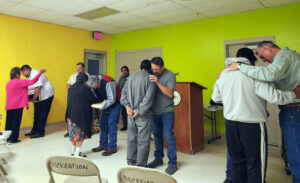
CAIRO (BP) — Islamic extremists and criminals are extorting Christians in Egyptian towns, while trouble brews over the country’s new protest law and constitution.
According to Morning Star News, a news service reporting on the persecuted church, Islamist radicals in several Egyptian towns have begun a campaign of terrorism and extortion against Christians.
Muslim extremists in a number of towns are demanding Christians pay the jizya, a Quran-based fine on non-Muslims known as the “humiliation” or “submission” tax. Human rights activists told Morning Star News that radicals and ordinary criminals have started a cottage industry from extorting Christians. They threaten kidnapping, torture and murder to seize money and property from Christians mainly in southern Egypt.
“What you are dealing with now is some criminals attacking Christians — Christians who own shops and things like that,” Mina Thabet, founding member of the Maspero Youth Union, told Morning Star News, adding that Islamists see persecuting Christians as a religious duty.
Almost every week, there are reports of Coptic Christians kidnapped and held for ransom. Ezat Ibrahim, director of the Minya branch of the Al-Kalema Human Rights Organization, told Morning Star News that many of the victims were tortured so severely that they could not even speak about what happened.
“This past month alone, we had nine cases of kidnapping in Minya, and they all paid their ransom, which was between 100,000 and 250,000 Egyptian pounds [US$14,500 to $36,300] for each case,” Ibrahim said.
One Copt who worked as a human rights researcher was kidnapped and severely tortured, with the kidnappers repeatedly firing an automatic rifle next to his ear, Morning Star News reported. The shockwaves and muzzle flash shattered the man’s eardrums and burned his face. Only after his family paid 50,000 Egyptian pounds ($7,260) in ransom was he freed.
According to Morning Star News, most of the attacks take place in the Minya Governorate, 152 miles south of Cairo, and the Assuit Governorate, 200 miles south of Cairo. In one village, Watani Weekly reported, a heavily-armed criminal group led by a man known as “Saddam Hussein” threatens to kill Christians or their children if they don’t pay the jizya. Many Copts have paid the extortion money, which can range from 25,000 to 250,000 Egyptian pounds ($3,360 to $36,300).
The ransom demands are exorbitant for normal Egyptians, Morning Star News reported, and are based on a perception among Muslims that Copts are wealthy. If someone can’t pay, he or she must beg friends and relatives to contribute, meaning one kidnapping can drain a community. Landowners who do not pay have their fields and livestock set on fire.
Thabet told Morning Star News that lack of police initiative, hatred for Christians among the perpetrators, and the failure of the justice system on behalf of Christians leads to a perception that Christians can be attacked with impunity.
“If you hurt a Christian, no one is going to do anything to you,” Thabet said. “No one is ever brought to justice in any sectarian violence against Christians.”
While Christians continue to suffer in the new Egypt, a controversial law banning unapproved protest has created an uproar spanning the political spectrum.
According to the Associated Press, the military-backed government passed the law on Nov. 24 to quash protests supporting former President Mohammed Morsi, who was ousted in a popularly-supported coup in July.
Islamist supporters rallied in the hundreds in Cairo and other parts of the country, the AP reported; film footage from Giza showed police firing tear gas at tire-burning protesters.
“We don’t care about the protest law whatsoever,” Ashraf Abdel-Wahhab, who was participating in a Cairo pro-Morsi protest with his wife and eight children, told the AP. “This is not the first time they attack marches or kill protesters. It’s just a cover that they’re using.”
In addition to its failure to stop protests by Islamist supporters of Morsi, the new law has sparked protests by Egypt’s secular activists, who fear the government is giving free rein to police and a pass to military abuses they fought to end in the 2011 revolution.
Security forces broke up several demonstrations by secular activists in late November, according to the AP. On Nov. 29, police arrested Alaa Abdel-Fattah, a top secular activist, for allegedly inciting protests in violation of the law. Manal Bahy Eldin, Fattah’s wife and fellow activist, said police beat her during the arrest.
“We reiterate the concerns we share with civil society representatives inside Egypt that the demonstrations law is restrictive and does not meet international standards,” Jen Psaki, a U.S. State Department spokesperson, told the AP. “Limiting freedom of assembly, association, and expression will not move Egypt’s political transition forward.”
While the government was trying to put down unrest, a government-appointed assembly worked on a final draft of an amended constitution, one that democracy advocates say increases the power of the military and president. The panel completed the amendment process on Dec. 2, with the next step being a referendum on the document, likely in January.
According to the BBC, Egypt’s Muslim Brotherhood immediately rejected the new document, claiming “abusive coupists” wanted to “distort Egypt’s legitimate constitution” that was approved under Morsi.
Parts of the revised constitution likely will anger secularist democracy advocates, according to the AP. One amendment states that the military gets the final say on approving the president’s choice for defense minister, effectively letting the military chose its own leader and granting it independence from civilian government. Another article allows the military to try civilians in its own courts in cases connected to violence toward military facilities or personnel.
While the draft maintains Islamic Sharia law as the basis for Egypt’s legislation, it bans religious political parties and refers to freedom of belief as “absolute,” rather than “protected” under the old document.
–30–
John Evans is a writer in Houston. Get Baptist Press headlines and breaking news on Twitter (@BaptistPress), Facebook (Facebook.com/BaptistPress ) and in your email ( baptistpress.com/SubscribeBP.asp).
















